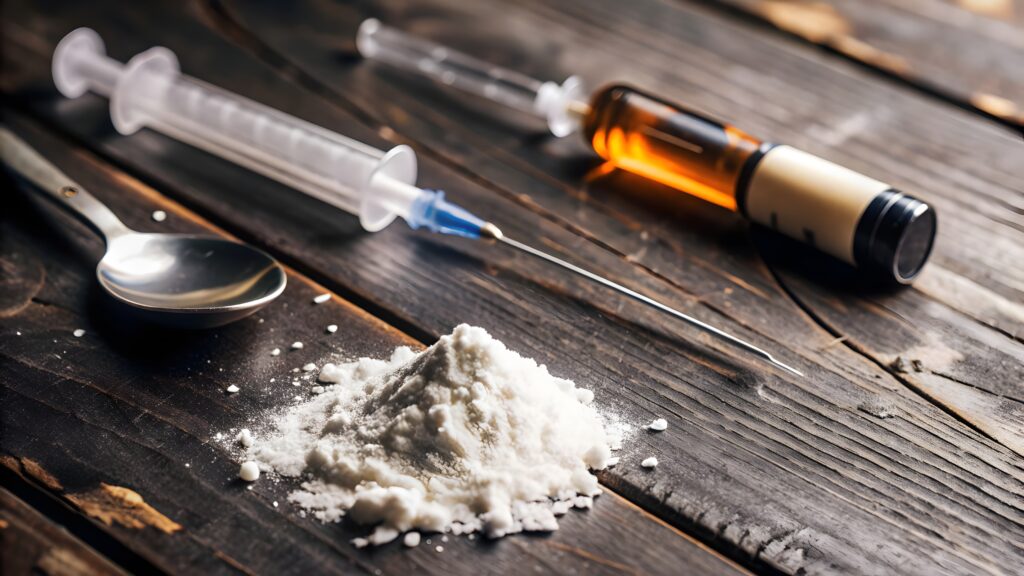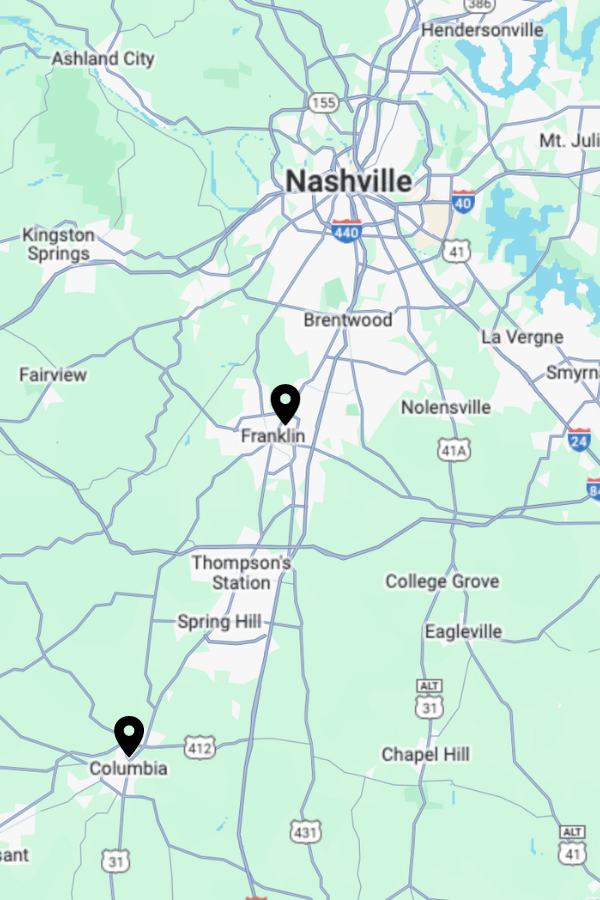Crack cocaine remains one of the most devastatingly addictive substances plaguing communities across the United States. According to the 2023 National Survey on Drug Use and Health (NSDUH), approximately 5 million Americans age 12 and older reported using cocaine (including crack) in the past year, highlighting the persistent challenge this substance presents.1
The drug’s powerful grip on users stems from its intense effects on the brain’s reward system. Insights from the National Institute on Drug Abuse (NIDA) show that crack cocaine dramatically interferes with the brain’s dopamine system, creating an intense euphoria followed by devastating crashes. This cycle of extreme highs and lows can trap users in a destructive pattern of addiction within a remarkably short time, often after just a few uses.2
At Apex Recovery, we understand the complexities of crack cocaine addiction and offer comprehensive treatment solutions at our Tennessee rehab facilities. Our crack rehabilitation programs, available in both Columbia and Franklin, provide evidence-based treatment approaches designed to address not only the physical dependence but also the underlying psychological aspects of addiction.
If you or someone you love is struggling with crack cocaine use, our compassionate admissions team is available 24/7 at (877) 881-2689 to discuss our Tennessee-based treatment options. Recovery for you or a loved one begins with just one call.

What is Crack?
Crack is a type of cocaine, which means it’s an addictive stimulant and a schedule II drug with a high potential for misuse. It’s created by converting powdered cocaine (cocaine hydrochloride) into a crystallized form by mixing it with water and baking soda or ammonia, then heating it to remove the hydrochloride. The resulting substance appears as small, rock-like crystals that produce a distinctive crackling sound when heated—hence the name “crack.”2
Crack produces a wide range of physiological and psychological short-term effects, including:2
- Potentially dangerously elevated heart rate and blood pressure
- Constricted blood vessels throughout the body
- Increased body temperature and metabolic rate
- Dilated pupils and potential visual disturbances
- Decreased appetite and sleep disturbances
- Intense euphoria followed by equally intense depression
- Increased alertness and hyperstimulation
- Severe anxiety and paranoia
- Aggressive behavior and irritability
- Potential psychosis and hallucinations
Free Addiction Assessment
Schedule a free, confidential assessment with a licensed clinician. Apex Recovery can check your insurance coverage levels for drug and alcohol addiction, and mental health treatment.
Crack Rehab Programs in Tennessee
If you’re wondering “So how do I get off crack?”, you’ve already taken the crucial first step: considering that you need help. The next step is to actually reach out for professional care, as it’s essential for overcoming crack cocaine addiction due to the condition’s complex physical and psychological effects on the body and brain. Successful treatment requires a comprehensive approach that addresses both the immediate effects of drug use and the underlying factors that contribute to addiction.
Treatment success rates increase significantly when individuals receive comprehensive care that includes medical supervision, behavioral therapy, and ongoing support. Studies show that a combination of therapeutic approaches provides the best outcomes for long-term recovery from crack cocaine addiction.5
At Apex Recovery’s Tennessee Rehab facilities, we offer a comprehensive continuum of care designed to support each stage of recovery. Our treatment journey begins with medically supervised crack detoxification to ensure safe withdrawal, followed by structured residential treatment programs for those requiring intensive, round-the-clock care.
As patients progress, they can transition to our partial hospitalization program (PHP), which provides intensive therapeutic support while allowing evenings at home, or our intensive outpatient program (IOP) for those ready to maintain daily responsibilities while continuing treatment. Throughout all levels of care, our team works closely with patients to develop thorough aftercare plans and provide ongoing support, ensuring a sustainable path to long-term recovery.
Crack Detox in Tennessee
Medically managed detox represents the crucial first step in treating crack cocaine addiction. During this phase of crack treatment, individuals receive medical supervision and care to ensure their safety and minimize symptoms.
Stimulant withdrawal symptoms tend to occur within one to two days of cessation, and they can last for up to two weeks.3 Stimulant withdrawal symptoms can include:3
- Persistent and intense drug craving
- Dehydration, hunger, chills
- Fatigue and physical/mental sluggishness
- Difficulty concentrating, impaired memory
- Insomnia followed by hypersomnia
- Weight gain
- Dissatisfaction/unease
- Clinical depression and suicidal ideation
- Anxiety and irritability
- Loss of interest in pleasurable activities
- Interpersonal withdrawal
- Intense and vivid drug-related dreams
At Apex Recovery’s Tennessee crack-rehab facilities, our medical team provides 24/7 supervision throughout the crack detox process. This continuous care ensures both safety and comfort through careful monitoring of vital signs, professional management of withdrawal symptoms, and immediate medical intervention if needed. Our comprehensive approach includes psychological support and counseling from the earliest stages, helping to prepare patients for the next phase of their recovery journey.
Residential/Inpatient Rehab for Crack in Tennessee
Following detoxification, residential treatment provides the structured environment and intensive therapy necessary for early recovery. The residential treatment experience at Apex Recovery begins with a thorough assessment that encompasses both medical and psychiatric evaluations. This comprehensive evaluation allows our team to develop an individualized treatment plan that addresses not only the addiction itself but also any co-occurring mental health conditions. According to the Substance Abuse and Mental Health Services Administration (SAMHSA), addressing these dual diagnoses simultaneously is crucial for successful long-term recovery.
Our evidence-based therapeutic approach combines several proven treatment modalities. Our individual, group and family therapy employs cognitive behavioral therapy (CBT) as a cornerstone of treatment, helping patients identify and modify harmful thought patterns and behaviors. This is enhanced by motivational interviewing, which helps strengthen patients’ commitment to recovery and personal growth. Plus, we offer holistic treatment (comprising yoga, meditation, art therapy, and more) alongside medication-assisted treatment (MAT) if appropriate.
Treatment duration, typically ranging from 30, 60 and 90 days, is individualized based on patient needs and progress. However, research indicates that longer periods of residential treatment correlate with better outcomes in crack cocaine recovery.6 Throughout their stay, patients work closely with their treatment team to develop comprehensive aftercare plans, ensuring a smooth transition to the next level of care.
Partial Hospitalization Program (PHP) for Crack in Tennessee
A partial hospitalization program represents a crucial intermediate level of care in crack cocaine treatment, bridging the gap between residential treatment and outpatient care. PHP is particularly beneficial for individuals who have completed residential treatment but need ongoing intensive support, or for those whose addiction severity and stability allow them to safely live at home while participating in concentrated daytime treatment. The program typically runs five to seven days per week, with patients attending treatment for several hours each day before returning home or to a sober living environment in the evenings.
At Apex Recovery’s Tennessee facilities, our PHP maintains many of the therapeutic elements of residential treatment while helping patients develop increased independence. Participants engage in comprehensive therapy sessions throughout the day, including individual counseling, group therapy, and family sessions. This intensive therapeutic schedule helps reinforce recovery skills while providing the support needed to address challenges that arise as patients begin reintegrating into their community.
The program’s structure allows for real-world application of recovery skills, as patients navigate daily life stressors while still maintaining close contact with their treatment team. This practical experience, combined with ongoing therapeutic support, helps patients build confidence in their ability to maintain sobriety in increasingly independent settings.
Intensive Outpatient Program (IOP) for Crack in Tennessee
Intensive outpatient programs (IOPs) offer a flexible yet structured approach to continuing care in crack cocaine recovery. Research published in the Harm Reduction Journal indicates that IOP can be highly effective for individuals who have completed more intensive levels of care or those whose addiction severity and stability allow for outpatient treatment.7
The IOP at Apex Recovery typically involves attending treatment sessions 3 to 4 times per week, with each session lasting several hours. This schedule allows patients to maintain work, school, or family commitments while receiving substantial therapeutic support. The program focuses on relapse prevention, life skills development, and ongoing recovery maintenance.
Treatment sessions in IOP incorporate evidence-based practices specifically tailored to crack cocaine recovery, including cognitive behavioral therapy, contingency management, and regular drug testing to support accountability. During IOP, patients work closely with counselors to address challenges that arise in their daily lives, developing and refining coping strategies for high-risk situations. The program also emphasizes building a strong support network within the recovery community, which is crucial for long-term sobriety. As patients progress through IOP, treatment plans are regularly adjusted to meet their evolving needs.
The flexibility of IOP makes it particularly suitable for individuals who have:
- Completed higher levels of care and are progressing in their recovery
- Maintained abstinence but need ongoing support
- Strong support systems at home
- Work or family obligations that preclude residential treatment
- The ability to maintain sobriety while living at home
- Please complete and send the form below.
- One of our staff members will contact your insurer to check your coverage.
- We will contact you promptly with the results and to discuss the next steps.
Insurance Verification
"*" indicates required fields
Rehab Centers that Offer Crack Rehab in Tennessee
The prevalence of crack cocaine addiction across Tennessee and the United States has led to the development of numerous treatment facilities offering specialized care for this challenging substance use disorder. Apex Recovery stands out among Tennessee’s treatment providers, offering comprehensive care at our facilities in the Columbia and Franklin areas near Nashville.
Our programs incorporate the latest evidence-based practices, including specialized protocols for crack cocaine addiction treatment. Both our outpatient and inpatient facilities feature state-of-the-art treatment amenities and experienced, licensed clinical staff specialized in treating stimulant use disorders.
Our Nashville-area locations make treatment accessible to residents throughout Middle Tennessee, while also serving individuals from surrounding states seeking quality care. The strategic placement of our facilities allows us to provide comprehensive treatment options while maintaining strong connections with local recovery communities and support services.
To learn more about treatment options and/or to verify your insurance benefits, reach out to our treatment advisors. They can answer your questions, offer an initial evaluation to help you identify a suitable level of care, and verify your insurance benefits. The call is free and confidential, and you’re under no obligation to enter care with us.
Crack Rehab Centers Near Nashville
Apex Recovery, with multiple facilities in Tennessee, offers comprehensive crack rehab near Nashville. Locations include Apex Recovery Franklin at 4601 Carothers Pkwy STE 250A, Franklin, TN 37067, and Apex Recovery Columbia with both inpatient and outpatient services at 2710 Trotwood Ave, Suite A, Columbia, TN 38401, United States.
Apex Recovery Franklin
4601 Carothers Pkwy STE 250A
Franklin, TN 37067
Apex Recovery Columbia
2710 Trotwood Ave STE A & B
Columbia, TN 38401
Does Insurance Pay for Crack Cocaine Rehab in Tennessee?
Thanks to the Affordable Care Act (ACA), most insurance providers offer coverage for substance use disorder treatment, including crack cocaine rehabilitation. Substance use disorder treatment is considered an essential health benefit, requiring insurance companies to provide coverage comparable to other medical conditions.
However, the specific level of coverage varies depending on several key factors:
- Insurance provider and specific plan details
- Level of care required (detox, residential, outpatient)
- Length of stay in treatment
- In-network vs. out-of-network providers
- Individual deductibles and co-payments
- Annual coverage limits
How to Pay for Crack Rehab Without Insurance
For individuals without insurance coverage, several alternative rehab payment options exist to help make treatment accessible. These options include:
- State-funded treatment programs
- Sliding scale fee structures based on income
- Payment plans and financing options
- Healthcare loans
- Treatment scholarships and grants
- Crowdfunding platforms
- Faith-based organization assistance
At Apex Recovery, we believe that financial constraints should never prevent someone from receiving needed treatment. Our admissions team works closely with each individual to explore all available payment options and develop a feasible financial plan for treatment.
How Much Does Crack Treatment Cost in Tennessee?
The cost of crack cocaine treatment in Tennessee varies significantly based on several factors. Key variables affecting treatment costs include:
- Program type and duration
- Level of medical care needed
- Facility location and amenities
- Staff expertise and specialization
- Additional therapeutic services
- Insurance coverage and network status
Treatment program duration and intensity also play a significant role in determining costs, with inpatient programs outpacing the costs of outpatient programs. According to data from the National Drug Helpline, average inpatient rehab for crack addiction costs $3,100 to $10,000 per month without insurance. Outpatient programs, on the other hand, tend to be less expensive, with costs ranging from $1,450 to $11,000 per month.8
The investment in treatment, however, should be weighed against the long-term costs of untreated addiction, including medical expenses, lost productivity, and legal issues. Our admissions team at Apex Recovery can provide detailed information about treatment costs based on individual circumstances and program requirements.

How to Find Crack Rehab Near Me in Tennessee
Treatment shouldn’t be a one-size-fits-all solution. So finding appropriate crack cocaine treatment requires careful consideration. The following steps can help you identify the most appropriate care for your needs:
- Research accredited facilities with specialized crack cocaine programs
- Verify insurance coverage and payment options
- Evaluate program components and treatment approaches
- Consider location and accessibility
- Review facility credentials and licensing
- Read patient testimonials and success rates
- Schedule facility tours or consultations
Apex Recovery’s admissions team is available 24/7 to help you navigate the treatment selection process. We can provide detailed information about our programs, verify insurance coverage, and help you take the first step toward recovery. Simply call (877) 881-2689 to learn more on how we can help.
Crack Addiction Statistics in Tennessee
Recent data reveals concerning trends regarding crack cocaine use in Tennessee. According to the 2023 National Survey on Drug Use and Health, substance use disorders continue to significantly impact communities throughout the state.
The impact of crack cocaine addiction is particularly evident in urban areas, with cities like Nashville, Memphis, and Knoxville reporting higher rates of stimulant-related emergency room visits and treatment admissions. Research indicates that socioeconomic factors often correlate with higher rates of crack cocaine use, with some communities experiencing disproportionate impact.9
Here are some key statistics that highlight the scope of the problem:
- In 2022, Tennessee was home to more than 3,800 fatal drug overdoses as well as 6,473 nonfatal overdoses with inpatient stays.10
- Roughly 1.3 million people aged 12 and older had a cocaine use disorder in the past year. Those in the 18- to 25-year-old age group had the highest prevalence rate of 0.6% (or 189,000 individuals).4
- In 2020, roughly 4,800 cases of crack cocaine trafficking were reported to the U.S. Sentencing Commission. The average sentence for cocaine trafficking was more than 6 years.11
Sources
- Substance Abuse and Mental Health Services Administration. (2023). National Survey on Drug Use and Health Table 1.1A.
- National Institute on Drug Abuse. (2024).Cocaine.
- Substance Abuse and Mental Health Services Administration. (1999). Treatment Improvement Protocol TIP 33.
- Substance Abuse and Mental Health Services Administration. (2023). Results from the 2023 National Survey on Drug Use and Health.
- Kampman KM. The treatment of cocaine use disorder. Sci Adv. 2019 Oct 16;5(10):eaax1532. doi: 10.1126/sciadv.aax1532. PMID: 31663022; PMCID: PMC6795516.
- Substance Abuse and Mental Health Services Administration. (1999). Treatment Improvement Protocol TIP 45.
- Goulian, A., Jauffret-Roustide, M., Dambélé, S. et al.A cultural and political difference: comparing the racial and social framing of population crack cocaine use between the United States and France. Harm Reduct J 19, 44 (2022). https://doi.org/10.1186/s12954-022-00625-5.
- National Drug Helpline. (2023). The Cost of Drug & Alcohol Rehab in 2023.
- Fukushima, André & Corrêa, Leonardo & Munoz, Juliana & Ricci, Esther & Carvalho, Virginia & Carvalho, Debora & Spinosa, Helenice & Chasin, Alice. (2019). Crack cocaine, a systematic literature review. Foresic Research & Criminology International Journal. 7. 10.15406/frcij.2019.07.00289.
- TN Department of Health. (n.d.). Data Dashboard.
- United States Department of Sentencing. (2020). Quick Facts: Crack Cocaine Trafficking Offenses.

